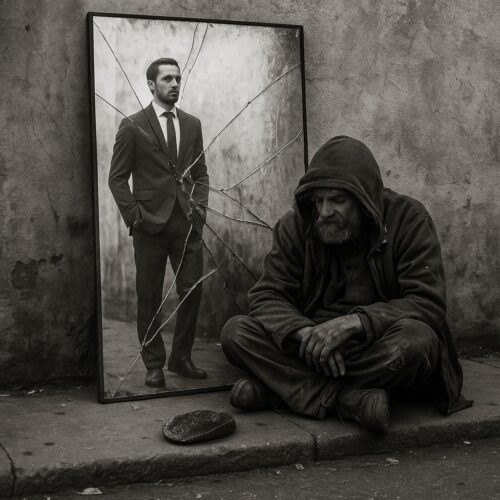Most people look at beggars as losers: people without discipline, without work, without value. But that narrative was constructed.
Not everyone on the street is like that. Many are just victims of raw misery, of alcohol, of drugs, of diseases that took everything from them. But there’s another type of beggar, rare and invisible: the one who already saw the machinery from the inside and decided not to cooperate. That’s the one this text is about.
This conscious beggar has already walked through the system from the inside. He worked, he tried, he fell into schemes, he observed how the networks of power function. He saw the rot up close: corruption, secret alliances, blackmail, social manipulation. And he realized the truth nobody wants to admit — the game is rigged from the start. It doesn’t matter how hard you try: if you don’t obey, you’ll never get anywhere. And even if you do obey, you still won’t get anywhere: you’ll just be another disposable piece, used to the limit and then replaced.
Nobody ends up on the street overnight. The fall is slow: first he loses a promising job, then a relationship, then a circle of friends. Doors close one by one, until he realizes there’s no way back. He doesn’t fall out of weakness; he falls because the system pushes him. Pushed to the limit, he faces the fact: the way back is gone.
From then on he stops believing in the official script — study, work, save, build a family, respect the laws. It all sounds false to him, like a mask covering the theater of the elites, who live off manipulation and exploitation. When the mind wakes up, two options remain: keep pretending or leave the board. He chooses to leave.
Life on the street is hard. It’s also a kind of freedom. No debts, no bosses, no social roles. The price is high — cold, hunger, loneliness. But there’s a peace: he no longer has to perform, he no longer has to pretend to believe in lies.
Stigma is part of the mechanism. Society is trained to despise the beggar, to see him as a failure. That way no one sees him as a symbol of resistance. They call him a junkie, crazy, lazy — not because it’s true, but because it fits the narrative. It’s invisible propaganda that protects the system.
And when someone sees a beggar on the street, they don’t know his past. He may have been a worker, a father, a businessman, a soldier, an artist. No one asks what he lived through or what he discovered. They just point the finger, convinced they’re looking at absolute failure. That indifference is the most effective weapon: turning an entire life into a label, erasing the story and leaving only the image of defeat.
Invisibility works as punishment and as a weapon. He’s in the middle of the city, everyone walks past him, but nobody looks at him. He sees everyone, but nobody sees him. They treat him like a living ghost, erased from normality. That invisibility is brutal loneliness — and also the last free space: he belongs to nothing and no one anymore.
But he isn’t the only one. There are others like him, rare and invisible, who carry the same truth. Some of these men say things nobody wants to hear. They speak of elite corruption, of the role of invisible organizations that control governments and businesses, of the lie of democracies that function as theaters. They are voices with nothing to lose — and because of that, they’re not afraid to speak.
Their bitter knowledge doesn’t fit in books. They know more about power than academics and journalists, not because they studied, but because they lived it. They’re not theorists; they have direct experience. They saw how judges are bought, how elections are manipulated, how heroes and scapegoats are manufactured. They are survivors who touched the naked machinery.
In the end, the conscious beggar is always the same: the final product of social engineering. The system couldn’t tame him, so it expelled him. Total exclusion is punishment for not cooperating. It’s also total freedom: he belongs to nothing and no one anymore. He’s a living ghost of the system’s failure.
The system didn’t destroy him completely — it left him alive just enough so that everyone can see the punishment imposed on those who refuse to play along.
September 2025
This article is in English. Read the Portuguese version ⇒ Ler em português
